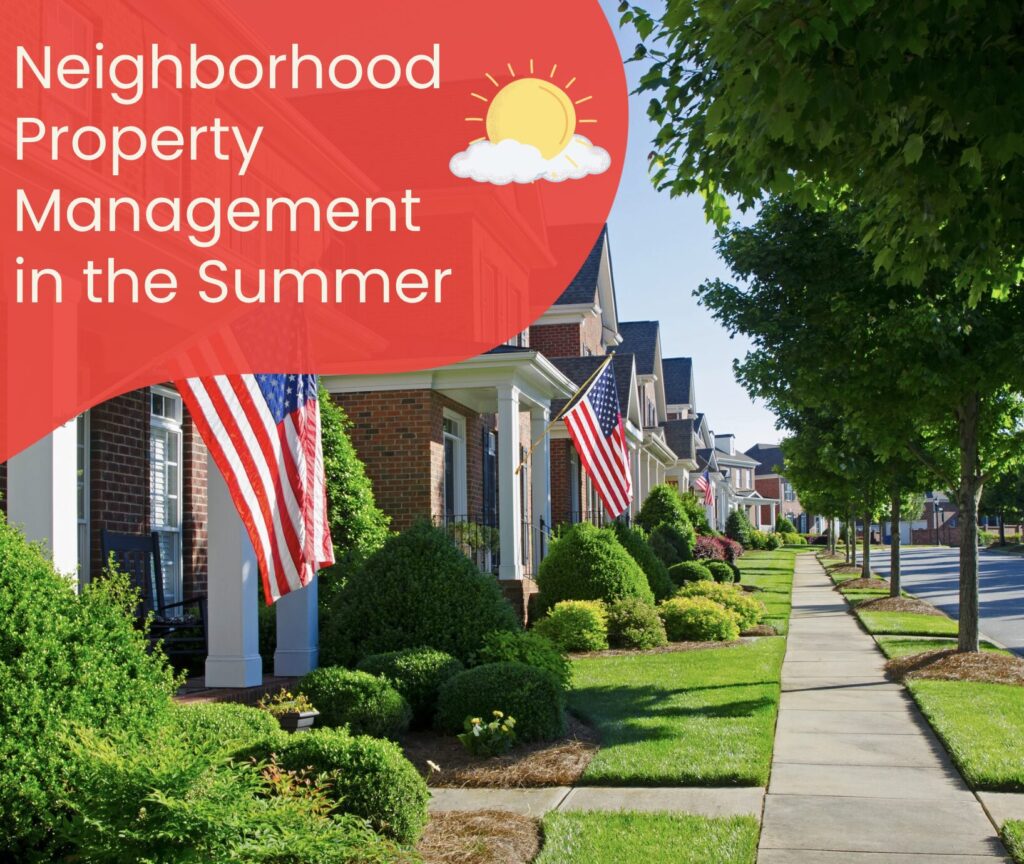
Neighborhood property management in the summer involves several tasks to ensure the area remains safe, attractive, and enjoyable for homeowners.
Here are some key steps to consider:
Lawn and Garden Care
Regular Mowing: Keep lawns trimmed to a consistent height. Regular mowing prevents weeds and keeps the area looking tidy.
Watering: Water grass, plants, and trees deeply but less frequently to encourage deep root growth. Early morning is the best time to water to reduce evaporation.
Weeding: Remove weeds from gardens and flower beds to prevent them from overtaking desirable plants.
Mulching: Apply mulch around plants to retain moisture, suppress weeds, and enhance the appearance of garden beds.
Turf Care: Use a slow-release fertilizer specifically formulated for summer. Avoid heavy feeding as it can stress the grass and encourage disease.
Trees and Shrubs
Pruning: Trim trees and shrubs to remove dead or diseased branches, and shape them as needed. This promotes healthy growth and improves the property’s appearance.
Pest Control: Check for signs of pests or diseases and take appropriate action to treat them.
Neighborhood Common Areas
Litter Removal: Regularly pick up litter and debris from sidewalks, streets, and communal areas.
Pathway Maintenance: Ensure pathways are clear of obstructions and repair any damage to prevent accidents.
Community Gardens: If there are community gardens, ensure they are well-maintained, with shared responsibilities for watering, weeding, and harvesting.
Safety and Accessibility
Lighting: Check and maintain outdoor lighting to ensure pathways and communal areas are well-lit at night for safety.
Playground Equipment: Inspect and maintain playground equipment to ensure it is safe for children to use.
Community Engagement
Organize Clean-up Events: Schedule regular neighborhood clean-up days to foster community spirit and keep the area clean.
Encourage Participation: Engage neighbors in maintaining the property by creating schedules or assigning responsibilities.
Sustainable Practices
Composting: Encourage composting of garden waste to reduce landfill use and create nutrient-rich soil.
Native Plants: Use native plants in landscaping as they require less water and are better adapted to the local climate.
Pest and Insect Control
Standing Water: Eliminate standing water to prevent mosquito breeding.
Rodent Control: Ensure garbage is securely stored and disposed of to prevent attracting rodents.
Special Projects
Beautification Projects: Consider planting flowers, adding benches, or creating small communal spaces to enhance the neighborhood’s appearance and functionality.
Seasonal Decorations: Coordinate seasonal decorations to enhance community spirit and aesthetic appeal.
By following these steps, you can help ensure that your neighborhood property remains a pleasant, safe, and attractive place throughout the summer.
Engaging the community and fostering a sense of shared responsibility can make neighborhood property management more manageable and enjoyable for everyone involved.
